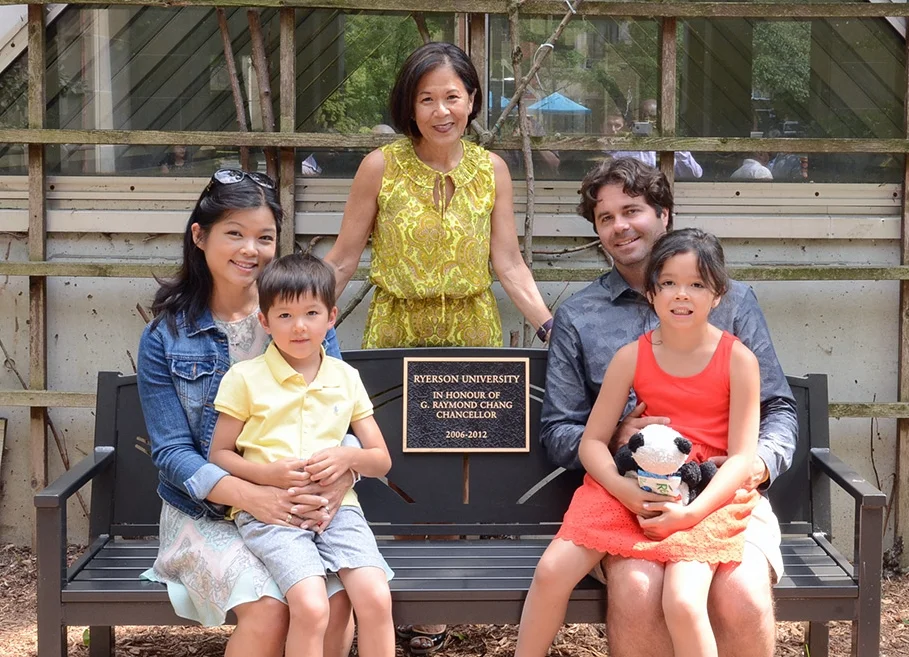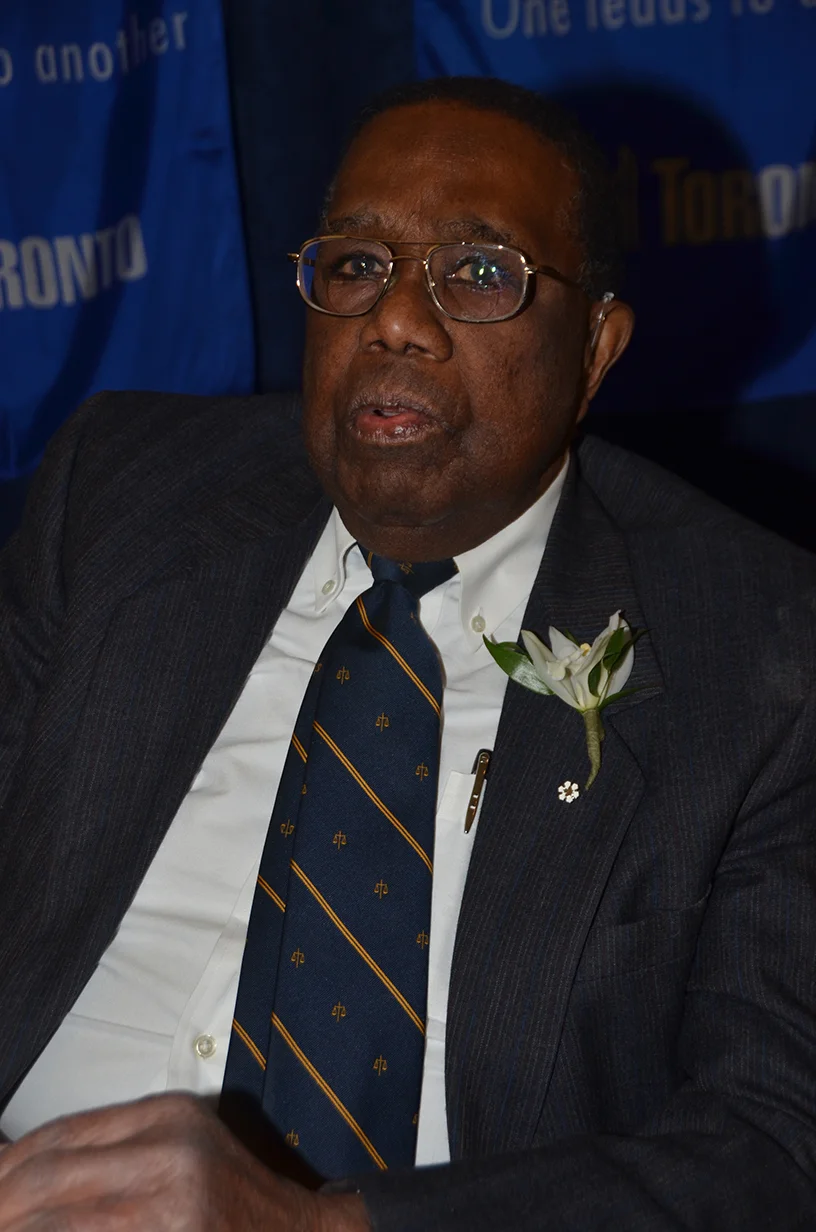Lincoln Alexander was a Canadian trailblazer’
It’s still as fresh in his memory as if it were yesterday. Dressed in a dapper suit, Kwesi Johnson recalled Lincoln Alexander telling him to keep looking sharp. That was five years ago at an event at Queen’s Park when the young man was presented with the Lincoln Alexander Award for Leadership in Eliminating Racial Discrimination.
The province established the awards two decades ago to recognize Alexander’s commitment to support young people and promote racial harmony.
Alexander, Canada’s first Black Member of Parliament, federal minister and Ontario’s first Black Lieutenant Governor, passed away last Friday. He was 90.
Johnson was among thousands who paid their last respects to Alexander at Queen’s Park on Monday. His state funeral takes place tomorrow in Hamilton.
“I was impressed by his charisma when he presented me with the award in 2007,” recalled Johnson who graduates next month with a Master’s in Sociology and Equity Studies. “He broke down many barriers on his way to the mountaintop and was a role model for me and so many other people. He was someone of style and substance.”
Prime Minister Stephen Harper said Alexander’s legacy will live on through his family, the schools and awards that bear his name and the memories Canadians hold of his long record of distinguished service while Premier Dalton McGuinty noted Alexander’s towering stature matched his influence.”
“He left an extraordinary legacy, both in his private life and as a public servant,” said McGuinty. “He broke down barriers. He made Ontario a better place for all of us, the next generation of public servants and citizens…Ontarians and indeed all Canadians will miss his passion, determination and hard work.”
Lieutenant Governor, David Onley, said Alexander – the first Black to run for parliament when he did so in 1965 – was a Canadian icon, recognized far and wide as a man who made a unique contribution to Canada and Ontario.
“Lincoln Alexander’s whole life was a rebuke to those who would equate ability with skin colour,” said Onley. “He overcame poverty and prejudice to scale professional and political heights.”
The second of three children and the product of a railway porter father and mother who migrated from St. Vincent & the Grenadines and Jamaica respectively, and who separated during his early years, Alexander – who was born on Simcoe St. in Toronto – attended Earl Grey Public School, Riverdale Collegiate and Dewitt Clinton High School in the Bronx, New York where he was one of the very few Black kids on his block that went to school.
Alexander went to live in Hamilton with his mother when they came back from the United States. He served with the Royal Canadian Air Force from 1942 to 1945, rising to the rank of corporal and was a wireless operator during World War II. After leaving the military, he enrolled in McMaster University in 1949 to study law and later attended Osgoode Hall Law School.
Jamaican-born MPP, Margarett Best, said Alexander has left an indelible mark on the province and Canada.
“I knew him quite well from my time in government and his visits to Queen’s Park,” said Best. “He was a great Canadian and a trailblazer who has left an endearing legacy that all Canadians can be proud of.”
A partner in the law firm of Millar, Alexander, Tokiwa and Isaacs after being appointed a Queen’s Counsel in 1965, Alexander – he was encouraged by John Diefenbaker to run for political office – was elected to the House of Commons in June 1968 after losing three years earlier.
“On the night that Diefenbaker won by a landslide in the 1965 elections, he said on TV that his only regret was that Lincoln had lost,” said human rights activist and retired union leader, Bromley Armstrong, who first met Alexander in the early 1950s. “I will never forget that.”
The Hamilton West Conservative Member of Parliament for 12 years served as Minister of Labour in Joe Clark’s minority government in 1979.
“Lincoln was a giant both in stature and his contributions,” Armstrong added. “He was humble and approachable and he blazed many trails.”
Alexander served as the first Black chair of the province’s Workers Compensation Board before being appointed Ontario first Black vice-regal in 1986. He insisted on being called “Linc” instead of “Your Honour” during his six years in the post in which he attended 4,060 functions, visited 235 schools, shook about 240,000 hands and signed nearly 60,000 orders-in-council and cabinet documents.
The Order of Ontario and Canada recipient and Hamilton-Wentworth, York Regional and Toronto Police honorary chief was the longest serving chancellor of the University of Guelph where he held the position for an unprecedented five terms, a record among Canadian universities. Five years ago, he was named chancellor emeritus in recognition of his lengthy and distinguished service to the university.
“He was an amazingly giving man, and thousands of University students, faculty, staff and alumni have benefited from his devotion, kindness and generosity,” said the university’s president, Alastair Summerlee.
A total of three University of Guelph awards bear Alexander’s name. They are the Lincoln Alexander Outstanding Leadership Award, the Lincoln Alexander Medal of Distinguished Service and the Lincoln Alexander Chancellor’s Scholarship. On campus, a refurbished teaching and research building called Lincoln Alexander Hall honours his commitment to the university.
Alexander, who underwent lung cancer surgery in 1993, was the first chair of the Canadian Race Relations Federation, established 16 years ago.
Jamaican-born Evelyn Myrie, who in 1996 co-founded the Rev. John Holland Memorial Awards that honour excellence in Hamilton’s Black community, said Alexander was adored and respected in the city.
“He was an iconic figure and a role model particularly for young people aspiring to reach great heights,” said Myrie, who is also the executive director of the Hamilton Centre for Civic Inclusion. “He is a symbol of hope for anyone who has suffered discrimination…He reached high places, but he never looked down on people. He was a man of the people and that’s why he was so beloved in Hamilton.”
Alexander, who enjoyed music and gardening and has a highway named after him even though he never drove, is survived by his second wife, Marni Beal, and his son, Keith. His first wife of 51 years – Yvonne – died 13 years ago after a lengthy battle with Alzheimer’s disease.






